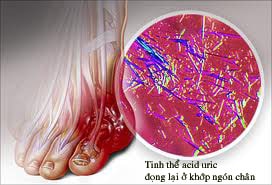Be careful with hyperuricemia
Hyperuricemia is quite common in the community. In addition to gout, hyperuricemia is also found in a number of other diseases, mostly in the elderly.
Why does NCT increase uric acid in the blood?
Hyperuricemiais caused by purine metabolism disorder, found mainly in adults, but the elderly account for a higher proportion. Uric acid is produced during the metabolism of nucleic acids in all cells in the body and is excreted mainly through urine.
In normal people, the two processes of uric acid production and excretion are always balanced. For some reason, especially in the elderly, the purine metabolism process is disrupted, causing increased uric acid in the blood.
Two phenomena: increased purine intake or decreased uric acid excretion or both occurring in parallel in the blood lead to increased uric acid. There are two favorable factors leading to this: One is genetics, in subjects whose organs are prone to dysfunctional uric acid release through the urinary tract due to abnormalities in metabolic enzymes (accounting for about 1%); Two is the environment, the most common is eating and drinking too much protein containing purines found in animal bodies (wild game meat, chicken skin, intestines, pork legs, beef brisket, heart, liver, kidney, brain, sausage, lap xuong), seafood (eel, sardines, mackerel) or drinking a lot of beer and alcohol (except wine).
This factor accounts for the highest proportion (about 90%). The onset is often due to drinking too much alcohol, eating too much animal organs or aquatic and seafood. In fact, purine in foods does not directly cause harm but only becomes toxic when combined with animal fat, because fat prevents the excretion of fatty acids.
Two factors that reduce uric acid excretion are drinking little water (less than 1.5 liters/day) and holding urine (for various reasons). These two factors are common in the elderly because they are lazy or afraid to drink water due to fear of frequent urination, especially at night, causing insomnia and therefore, they often hold urine. The more urine is held, the less water is drunk, the more uric acid in the blood increases.
Therefore, some people do not eat foods containing purines but still have hyperuricemia. In addition, some people have increased uric acid in the blood but the cause is unknown, such as people withhypertension, hyperparathyroidism or certain drugs that increase uric acid in the blood (cyclosporine, pyrazinamide, ethambutol, low-dose aspirin) or in people with kidney disease due to lead poisoning.

What harm does high uric acid in the blood cause?
In the normal human body, the metabolism of purine substances creates a constant amount of uric acid in the blood (men from 180 - 420mmol/l, women from 150 - 360mmol/l). When the uric acid index in the blood is higher than normal, it is called hyperuricemia.
Thus, hyperuricemia is caused by metabolic disorders. The leading cause of hyperuricemia is people who have had or are suffering from gout. When suffering fromgoutthen there is definitely increased uric acid in the blood.
However, when testing shows increased uric acid in the blood, it is not certain that you have gout (of course, in addition to increased uric acid, gout also has other, very typical symptoms). Some diseases related to increased uric acid in the blood are kidney stones, chronic kidney failure, multiple myeloma, hemolytic anemia, leukemia, use of cytotoxic chemicals in cancer treatment, some people with high blood pressure or diabetes, obesity, hyperlipidemia.
Increased uric acid in the blood is harmful to health, but it is even more harmful to the elderly, because when uric acid in the blood increases, if it precipitates and deposits in the heart and blood vessels, it will cause vasculitis, atherosclerosis, coronary insufficiency, stroke or pericarditis. If precipitated in the head, it can cause conjunctivitis, iritis, parotitis, meningitis. If precipitated in the genital area, uric crystals cause orchitis and prostatitis.
According to a study in the Netherlands, middle-aged gout patients are more likely to have high blood pressure (43%), high blood cholesterol (5%) and diabetes (>50%). Therefore, joint specialists have a new perspective: gout is an early sign of heart and vascular diseases.
How to prevent effectively?
Prevention of hyperuricemia is mostly related to diet and drinking, in which foods rich in purines are the most important. Therefore, people who have had hyperuricemia, especially gout, need to eat and abstain properly. Do not eat animal organs such as heart, liver, kidney (ovary), intestines. Some types such as chicken skin, duck, goose, and goose should also be limited or not eaten.
Foods such as sausages, salami, and smoked meats should also be limited. Seafood should also be considered in terms of pros and cons when used by people with hyperuricemia. Do not drink alcohol or beer (except red wine which can be used as an appetizer when necessary); Drink enough water (1.5 - 2 liters/day), do not hold urine... Treatment of hyperlipidemia in patients with gout is to reduce pain and use drugs to increase uric acid excretion.
According to Health & Life - NT
